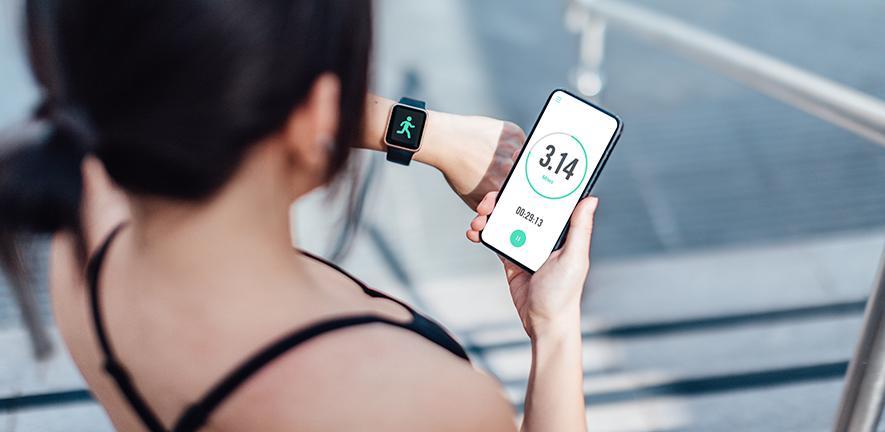The Role of Wearable Technology in Fitness App Development

Strong 8k brings an ultra-HD IPTV experience to your living room and your pocket.
In recent years, the marriage between technology and fitness has transformed the way individuals approach their health and wellness goals. With the advent of wearable technology, such as fitness trackers, smartwatches, and other health monitoring devices, the fitness industry has witnessed a significant evolution. These wearable gadgets have not only revolutionized how people track their physical activity but have also become integral components of fitness app development. In this article, we'll delve into the profound impact of wearable technology on the development of fitness apps, exploring the benefits, challenges, and future prospects of this dynamic relationship.
✍️ Looking to save costs while reaching a wider audience? Discover the pros and cons of cross-platform app development and see why startups and enterprises are adopting Flutter and React Native.
The Rise of Wearable Technology in Fitness
Wearable technology has experienced a meteoric rise in popularity, with an increasing number of individuals embracing these devices as essential tools for monitoring and improving their fitness levels. Fitness trackers, equipped with sensors capable of tracking steps, distance traveled, calories burned, heart rate, and even sleep patterns, have become ubiquitous accessories for fitness enthusiasts and health-conscious individuals alike. Moreover, smartwatches have expanded their functionality beyond simply telling time, offering features such as GPS tracking, workout guidance, and notifications for incoming calls and messages.
Integration with Fitness Apps: Enhancing User Experience
One of the most significant contributions of wearable technology to fitness app development is its seamless integration with mobile applications. By leveraging the data collected by wearable devices, fitness apps can provide users with a comprehensive view of their health and fitness metrics, enabling them to set goals, track progress, and make informed decisions about their lifestyle choices. For instance, fitness apps can sync with wearable devices to automatically log workouts, monitor heart rate during exercise, and provide personalized feedback based on the user's performance.
Personalized Insights and Recommendations
Wearable technology combined with advanced algorithms and machine learning capabilities allows fitness apps to deliver personalized insights and recommendations tailored to each user's unique needs and preferences. By analyzing data collected from wearable devices, such as activity levels, sleep patterns, and heart rate variability, fitness apps can provide actionable recommendations for optimizing workouts, improving sleep quality, and managing stress levels. Furthermore, these apps can offer personalized workout plans, nutritional guidance, and motivational messages to keep users engaged and motivated on their fitness journey.
Challenges and Considerations
Despite the numerous benefits of integrating wearable technology into fitness apps, developers face several challenges and considerations. Privacy and data security are paramount concerns, as the collection and storage of sensitive health data raise ethical and regulatory issues. Developers must implement robust security measures to safeguard user information and comply with applicable data protection laws and regulations, such as the Health Insurance Portability and Accountability Act (HIPAA) in the United States.
Additionally, ensuring interoperability and compatibility with a wide range of wearable devices presents technical challenges for developers. With numerous manufacturers producing wearable gadgets with varying hardware specifications and software platforms, developers must adopt standardized protocols and APIs to facilitate seamless integration with different devices. Moreover, optimizing battery life and minimizing resource consumption are critical considerations for ensuring optimal performance and user experience across various wearable platforms.
Future Prospects and Innovations
Looking ahead, the synergy between wearable technology and fitness app development is poised to drive further innovations in the health and wellness industry. Advancements in sensor technology, artificial intelligence, and cloud computing are paving the way for more sophisticated wearable devices and intelligent fitness apps capable of delivering personalized, real-time insights and interventions. Moreover, the integration of virtual reality (VR) and augmented reality (AR) technologies holds the potential to revolutionize the way individuals engage with fitness activities, providing immersive and interactive experiences that motivate and inspire users to achieve their fitness goals.
In conclusion, wearable technology plays a pivotal role in shaping the future of fitness app development, empowering users to take control of their health and wellness like never before. By harnessing the power of wearable devices, fitness apps can deliver personalized insights, actionable recommendations, and engaging experiences that inspire individuals to lead healthier, more active lifestyles. As technology continues to evolve, the possibilities for innovation in the intersection of wearable technology and fitness are limitless, promising an exciting journey ahead for developers, users, and the entire fitness ecosystem
Note: IndiBlogHub features both user-submitted and editorial content. We do not verify third-party contributions. Read our Disclaimer and Privacy Policyfor details.







